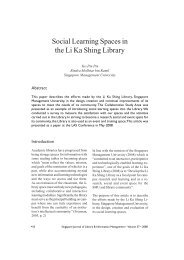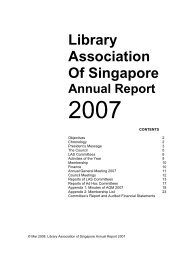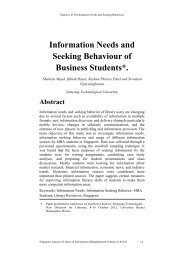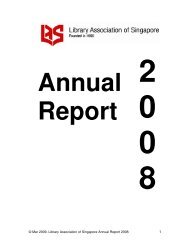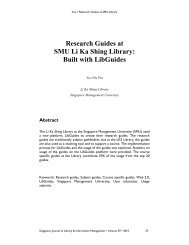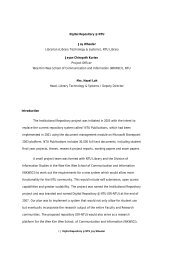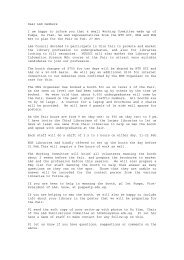The Impact of Technostress on Organisational Commitment among ...
The Impact of Technostress on Organisational Commitment among ...
The Impact of Technostress on Organisational Commitment among ...
Create successful ePaper yourself
Turn your PDF publications into a flip-book with our unique Google optimized e-Paper software.
Ungku Norulkamar • <str<strong>on</strong>g>Impact</str<strong>on</strong>g> <str<strong>on</strong>g>of</str<strong>on</strong>g> <str<strong>on</strong>g>Technostress</str<strong>on</strong>g>According to Harper (2000), there were two forms <str<strong>on</strong>g>of</str<strong>on</strong>g> technostress affectinglibrarians; the physical form and the psychological form. Complaints <str<strong>on</strong>g>of</str<strong>on</strong>g> headache,backstrain, eyestrain, repetitive strain injuries such as Carpal tunnel syndrome,and muscular dysfuncti<strong>on</strong>s were some <str<strong>on</strong>g>of</str<strong>on</strong>g> the physical forms <str<strong>on</strong>g>of</str<strong>on</strong>g> technostress. <str<strong>on</strong>g>The</str<strong>on</strong>g>psychological forms <str<strong>on</strong>g>of</str<strong>on</strong>g> technostress suffered by librarians included feelingdrained, informati<strong>on</strong> overload, overidentify with technology, underwork, anddoing routine jobs. In additi<strong>on</strong>, the fear that computers were taking over theirroles also led to feelings <str<strong>on</strong>g>of</str<strong>on</strong>g> job insecurity. <str<strong>on</strong>g>The</str<strong>on</strong>g>re were also feelings <str<strong>on</strong>g>of</str<strong>on</strong>g> jealousyam<strong>on</strong>g librarians when their levels <str<strong>on</strong>g>of</str<strong>on</strong>g> technology competencies differed andresulted in the loss <str<strong>on</strong>g>of</str<strong>on</strong>g> motivati<strong>on</strong> and team spirit. Spending so much time workingwith new technology also gave rise to feelings <str<strong>on</strong>g>of</str<strong>on</strong>g> job role uncertainty especiallywhen librarians find themselves doing the job <str<strong>on</strong>g>of</str<strong>on</strong>g> systems librarians.An <strong>on</strong>line survey by Kupersmith (2006) c<strong>on</strong>firmed that technostress existed in thelibrary setting. In fact, more than half <str<strong>on</strong>g>of</str<strong>on</strong>g> the librarian surveyed (59%) felt thatstress had increased in the past five years and almost two third <str<strong>on</strong>g>of</str<strong>on</strong>g> the resp<strong>on</strong>dentsbelieved that the problem was somewhat serious. It was also revealed by the studythat the leading causes <str<strong>on</strong>g>of</str<strong>on</strong>g> technostress in the library were informati<strong>on</strong> overload,networking problem, security issues and computer hardware, and erg<strong>on</strong>omics.Nevertheless, this finding somewhat c<strong>on</strong>tradicted with the findings <str<strong>on</strong>g>of</str<strong>on</strong>g> Poole andDenny (2001). A state-wide survey <str<strong>on</strong>g>of</str<strong>on</strong>g> community college library revealed that amajority <str<strong>on</strong>g>of</str<strong>on</strong>g> the librarians there felt that technology had neither increased nordecreased their amount <str<strong>on</strong>g>of</str<strong>on</strong>g> workplace stress. This may be due to the str<strong>on</strong>g statewidetraining available to the community college library pers<strong>on</strong>nel. A majority(82%) <str<strong>on</strong>g>of</str<strong>on</strong>g> the resp<strong>on</strong>dents agreed that the quality <str<strong>on</strong>g>of</str<strong>on</strong>g> the training provided wasmoderately good to excellent. This goes to show the importance <str<strong>on</strong>g>of</str<strong>on</strong>g> training inalleviating technostress.<str<strong>on</strong>g>The</str<strong>on</strong>g> development <str<strong>on</strong>g>of</str<strong>on</strong>g> internet and electr<strong>on</strong>ic networked resources encouraged thedevelopment <str<strong>on</strong>g>of</str<strong>on</strong>g> new services such as digital libraries. However, this might pose agreat challenge since the internet was also seen as a threat as it created a lot <str<strong>on</strong>g>of</str<strong>on</strong>g>uncertainty (Melchi<strong>on</strong>da, 2007). Although there would be some who wereoptimistic and proactive, there were others who feel threatened and resistant sincethey have no idea how to manage, work in, and survive in this new envir<strong>on</strong>ment.In additi<strong>on</strong>, the internet was also causing a sense <str<strong>on</strong>g>of</str<strong>on</strong>g> job insecurity. Somelibrarians feared that they would no l<strong>on</strong>ger be needed as library users would beable to use the internet without their help. Some librarians also felt threatened bySingapore Journal <str<strong>on</strong>g>of</str<strong>on</strong>g> Library & Informati<strong>on</strong> Management • Volume 38 • 2009 108




